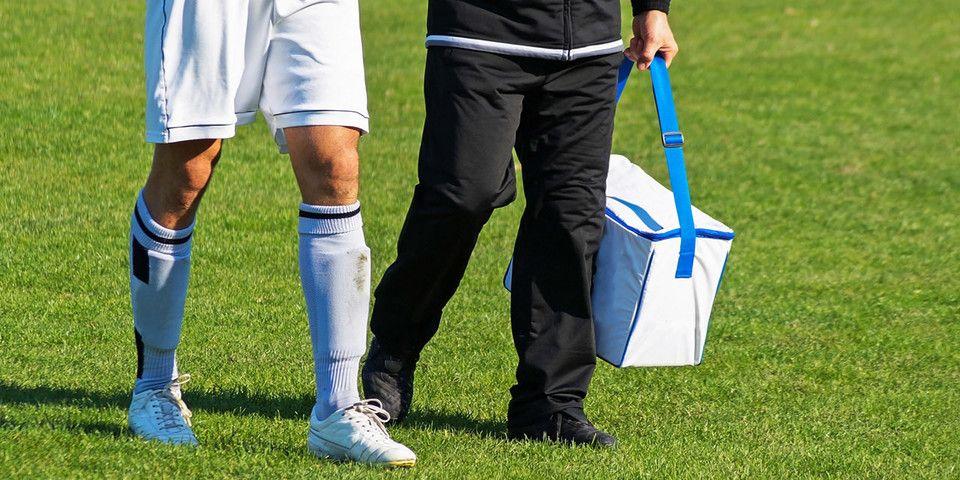What Does My Cycling Knee Pain Mean?
Rothman Orthopaedic Institute Offers Treatments That Address Cyclists’ Knee Pain
For an athlete, there is nothing more disruptive or frustrating than interruptions to activity and training. Among cyclists, knee pain is a common issue that can derail training plans and inhibit your ability to participate in normal cycling activity.
Are you experiencing painful symptoms of cycling knee pain? If so, at Rothman Orthopaedic Institute, we can offer you answers about your condition, and effective treatment to get you back on your bike.
As Sports Medicine specialists, we offer targeted treatments for the orthopaedic issues that are at the root of your biking knee pain. And as expert physicians with extensive experience treating athletes, we can provide informed answers to your most pressing questions and concerns. Listed below are answers to some of the typical questions that injured cyclists tend to ask.
What is the source of my cycling knee pain?
Most cycling knee pain results from a condition known as patellofemoral pain syndrome. This condition is commonly brought on by athletic overuse or high-impact use of the knees (among bikers, overuse is the more common culprit.) Malalignment of the patella (kneecap) can also cause or exacerbate issues. Patellofemoral pain syndrome causes pain both during activity and while at rest; it may also cause crackling noises and sensations in the knee joint.
Are there activity adjustments I can make to address pain?
There are a number of small changes you can make to your cycling activity to reduce or eliminate knee pain. Reducing the intensity or duration of your activity is an important first step. Sports Medicine physicians also recommend the following:
-
Adjusting your bike seat to a height where the knees only bend slightly
-
Riding in lower gears to reduce strain on the knees
-
Positioning your knees straight rather than leaning inward or outward
If pain persists, do I need to cease cycling?
If making the above adjustments does not effectively reduce knee pain, you should take a temporary break from cycling activity. This will allow your knees to rest and will help you to determine whether cycling is the source of your symptoms. It will likewise prevent further musculoskeletal damage from occurring.
Are there effective treatments for cycling knee pain?
Orthopaedic specialists can provide you with comprehensive care that treats the cause of your knee symptoms and ultimately enables you to return to cycling. Depending on the severity of your knee issue, a non-surgical or surgical treatment option may be recommended.
Non-surgical options include RICE (rest, ice, compression, and elevation,) physical therapy, anti-inflammatory medications, and the use of orthotics or supportive braces to stabilize the knee. If your condition is severe, arthroscopic knee surgery may be recommended as the most effective solution for long-term relief.
How long should I wait before resuming cycling?
If your treatment has been minor and non-surgical in nature, cycling activity should be reintroduced gradually and paired with strength-building knee exercises. Intensity and duration of activity can be slowly increased over time. Following a surgical treatment, patients should not participate in athletic activity for several weeks to several months, depending upon your doctor’s recommendations.
Will orthopaedic issues affect my long-term ability to cycle?
Cycling is a generally low-impact sport, so an injury such as patellofemoral pain syndrome should not prevent you from cycling in the long-term. It may be necessary, however, to adjust and moderate the intensity of your activity to prevent further injuries.
Orthopaedic Care for Cyclists at Rothman Orthopaedic Institute
The Sports Medicine specialists at Rothman Orthopaedic Institute are proud to offer the skills, knowledge, and treatment options that injured athletes experiencing cycling knee pain need to make a successful recovery and resume cycling activity. To learn more or to schedule an appointment, visit us here or contact us at 1-800-321-9999.
Related Physicians
Related Specialties
Related Treatments
- Bilateral Knee Replacement
- Loose Bodies/Spurs Surgery (Knee)
- Minimally Invasive Knee Surgery
- Non-operative Knee Arthritis Treatment
- Non-operative Runner's Knee (Chondromalacia Patella) Treatment
- Non-Operative Treatment Alternatives for Loose Bodies in the Knee
- Partial Knee Replacement (Unicompartmental and Patellofemoral Replacement)
- Revision Knee Surgery
- Total Knee Arthroplasty
- Total Knee Replacement
Related Programs
-

Athletic Training- Sport Medicine Outreach
Our Field Athletic Trainers provide direct sports medicine care to youth, high school, college and professional athletes. Rothman AT’s provide athletic training services throughout Southeastern PA to interscholastic high schools, colleges, as well as tournaments and special events.Read More




